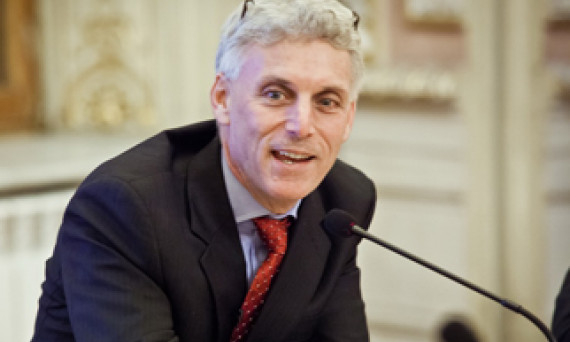Before starting his short lecture about the development of nation-states in Central Asia Andrew Wachtel, the President of the American University of Central Asia (AUCA) underlined that he is not an expert of the region and could only share his knowledge and experience by putting the topic into a specific context with reference to similarities and differences between Central Asia and the Balkans. "Central Asia is the Balkans in slow motion, it feels like living in a laboratory of nation-making".
More illustrious and powerful statements were yet to come, but Wachtel preferred to skip briefly through what Americans and Europeans might know about the region and define a few of the common or different features that the Balkans and Central Asia might be sharing. Both have been borderlands and peripheries of empires. But they came to the idea of a monoethnic nation-state being the more preferable ideal of state-building at different times, the Balkans running ahead of the Central Asians for at least about a century. He specified then the three ways to make sure a nation is homogenous enough, where assimilation (often applied by Europeans, as Wachtel finds) is the most humane path followed by deportation and, finally, killing. The latter, obviously, is the worst case to follow. There appeared a fourth option too, however. That is, if an ethnic minority is small enough, the newly emerging nation can opt to ignore the former. With brief references to Tsarist and Soviet history and a comparison of Russian and Western policies, Prof. Wachtel concluded that colonization has been perceived in Central Asia more positively as opposed to colonies elsewhere. Had it not been the Russians here, we would be like Afghanistan now,- Wachtel quoted a generalized local opinion.
Throughout the two post-Soviet decades nation-building went remarkably quickly and remarkably well in the Central Asian republics. Certainly, there was less bloodshed in the region unlike the Balkans. There were a few reasons why it went relatively smoothly, as Andrew Wachtel defined it. First, Soviet internationalism seems to have worked in Central Asia, while Yugoslavism failed in the Balkans. Besides that, the leaders of all five republics have been holding the highest positions since Soviet times. None of them were democratically elected and none of them needed to use nationalist rhetoric to gain popular support. Therefore, until nation-states are consolidated in the region, Europeans should think twice before promoting democracy in Central Asia. The later democracy comes to Central Asia, the better for the ethnic minorities. To further support his point, Andrew Wachtel pointed at the example of Kyrgyzstan being relatively the most democratic republic in the region which, however, has also had the most severe problems with interethnic violence. He returned to this point once again during the Q&A session, saying that democracy does not seem to be a fitting option to deal with the 'mess in Tajikistan'. Oleg Kharkhordin, the rector of the European University at St. Petersburg, made a joking remark saying this has been one of the most anti-democracy lectures delivered at the EUSP. Finally, Wachtel also specified the dependence of some of the Central Asian states on international aid, which in its turn, according to him, has been the restraining power not allowing local leaders to apply ethnic violence and discrimination.
Nevertheless, the region still remains quite diverse and all republics have ethnic minorities to deal with. On the other hand, there are no solid and firmly consolidated national identities in the region, Wachtel finds. They often do not clearly know and are unable to define what makes one a Kyrgyz or an Uzbek. As a case study and poll has demonstrated, only one of the 50 participating students found Kyrgyz language an important identity marker, some of them mentioned religion, but overall there were no dominant and prevailing features that the local youth could underline as part of what makes them different from non-Kyrgyz.
At the end of his speech Andrew Wachtel talked in more detail about his vision of the future of the Central Asian states, the foreign policy options and local fears of the leaders and regular citizens of the republics as well as the mission of AUCA in the region, answering the questions of the guests and students of the EUSP International Programs.
- You teach Russian literature at the AUCA, - EUSP rector Oleg Kharkhordin said before closing the event, - given the context of your lecture today, could you specify why Russian literature is taught there today? Is that an attempt to prevent Russian emigration from the region or, possibly, a way to demonstrate the achievements of American academia in Slavic studies?
- The youth often does not know literature. They are good at looking into the monitors,- to summarize Wachtel's somewhat more elaborate answer, - we teach them to critically read texts. They should not be reading a novel in five minutes. It does not necessarily have to be Russian literature, we teach our students to analyze, concentrate and to read.
Gevorg Avetikyan




















